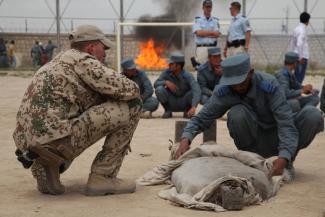Fragile states
A quarter-century-long task

In Afghanistan, the radical Islamic Taliban still clashes daily with the government’s security forces, despite ongoing international efforts to find a political solution. What’s more, poverty rates in the country have climbed from 39 % to 54 % over the past five years even though donor countries have invested billions. At a conference hosted by the KfW Development Bank in January in Berlin, participants discussed how lessons learned from almost two decades of crisis work in Afghanistan should apply to other fragile states.
According to data from the OECD, around 1.8 billion people currently live in 58 fragile states and regions, most of which are located in sub-Saharan Africa, the Arab region and central Asia (see article by Katja Dombrowski in E+Z/D+C e-Paper 2018/11, Monitor section). Their governments are either unable or unwilling to guarantee security, enforce the rule of law and provide basic social services. State institutions are weak, and arbitrary political action, violence, corruption and poverty are widespread. Fragility is a lasting and growing phenomenon.
According to the Aga Khan, the leader of 20 million Ismailites and founder of the Aga Khan Development Network (AKDN), one of the largest private development organisations (see article by Alphonce Shiundu in D+C/E+Z e-Paper 2017/12, Focus section), there are three essential principles for working successfully in fragile regions:
- concentrate on the local level,
- consult with everyone involved and
- invest in private enterprises and civil-society organisations.
“In fragile situations, it is easiest for donors to build trust and establish credibility at the local level,” the Aga Khan said at the KfW event. The AKDN is an important partner of Germany’s Federal Foreign Office and the KfW Development Bank in Afghanistan. Since 2010, they have jointly invested around € 100 million in infrastructure projects like schools, streets, bridges and government buildings in northern Afghanistan.
The Aga Khan’s second principle reflects his commitment to pluralism. He believes that a society must make it possible for different interests and lifestyles to coexist peacefully. “In fragile contexts, therefore, everyone involved has to be consulted and every member of the community must benefit,” he emphasised. Finally, he stressed the importance of civil-society organisations. “They provide continuity and stability in those places where the politics and security situation are unstable.” According to him, Germany should remember these three principles in its future work in Afghanistan and other world regions. “The world needs Germany’s principled and pragmatic leadership now more than ever.”
Jürgen Trittin is critical of Germany’s role, however, particularly with regard to Yemen. Trittin is a member of the Bundestag’s Committee on Foreign Affairs and belongs to the Green Party. His warns that Germany’s Federal Government “should not exacerbate the crisis situation by supplying weapons to the warring parties” in crisis areas. However, Saudi Arabia is an important buyer of German munitions and directly involved in Yemen’s civil war. In the third quarter of 2018, the German government approved exports to Saudi Arabia amounting to roughly € 254 million.
A multi-front war has raged in Yemen since 2015, and no political solution is in sight. The UN has called it the largest humanitarian crisis in the world.
At the same time, the war in Afghanistan is entering its eighteenth year. That is how long Germany and NATO allies have been involved. Nevertheless, the Taliban have been able to regain control of large parts of the country. In spite of these difficulties, Trittin believes that long-term engagement is the key to stabilisation. “That includes the willingness to commit to the region for a quarter century and the courage to finance the operations from beginning to end,” he says. The possible partial withdrawal of the US from Afghanistan that President Donald Trump announced in December is very problematic in his view.
If US troops pull out, Minister of Defence Ursula von der Leyen wants to end Germany’s engagement in Afghanistan too. The security situation would probably deteriorate, which would also cause aid organisations to withdraw their employees. That would mean losing the most important thing: the trustworthy network that makes the work of organisations like the AKDN possible in the first place.






